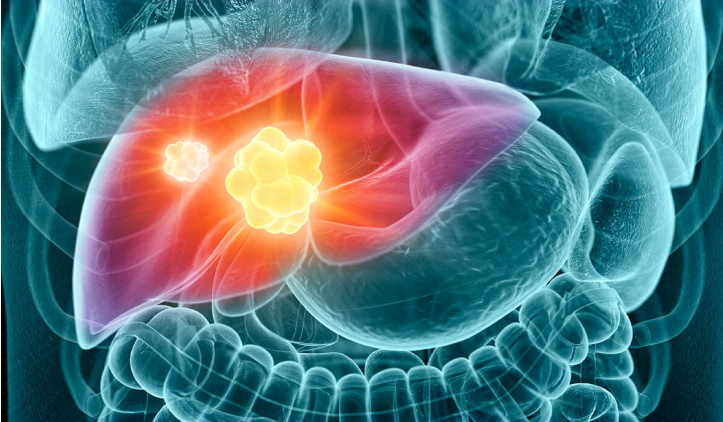Liver Cancer

What Is the Liver?
The liver is a large, vital organ located in the upper right abdomen beneath the diaphragm. It plays a central role in detoxifying harmful substances, metabolising medications, producing proteins essential for blood clotting, and storing energy in the form of glycogen. The liver also converts nutrients from food into important compounds and produces bile to aid digestion.
What Is Liver Cancer?
Liver cancer (hepatocellular carcinoma) is a cancer arising from the liver. It is also known as primary liver cancer or hepatoma. The majority of primary liver cancers (over 90 to 95%) arise from liver cells, which make up 80% of liver tissue and are called hepatocellular cancer or carcinoma.
Metastatic liver disease (cancer), or secondary liver cancer, is cancer that has spread to the liver, originating in other organs such as the colon, stomach, pancreas, breast, and lung. Thus, the term liver cancer actually refers to either metastatic liver cancer or hepatocellular cancer.
How Common Is Liver Cancer in Singapore?
Liver cancer is a significant health concern worldwide. In Singapore, it ranks as the fifth most prevalent cancer among men. This condition is more frequently observed in individuals over the age of 50.
What Are the Stages of Liver Cancer?
Liver cancer staging classifies the disease based on tumour size, location, and extent of spread. It helps doctors assess the disease progression and determine an appropriate treatment plan. The stages of liver cancer range from I to IV, each indicating a different severity level.
Stage I
Stage I liver cancer involves a single tumour confined to the liver. It is typically less than 2 cm in size and has not yet invaded nearby lymph nodes or distant sites.
Stage II
In stage II, either a single tumour has invaded nearby blood vessels within the liver, or there are multiple tumours all smaller than 5 cm, still confined to the liver.
Stage III
At this stage, one or more tumours—with at least one exceeding 5 cm in size—may have spread to one of the major blood vessel branches in the liver (either the hepatic or portal vein) and other nearby organs.
Stage IV
Stage IV is the most advanced stage of liver cancer, where the cancer has metastasised to distant lymph nodes and organs in the body, such as the lungs or bones.
What Are the Types of Liver Cancer?
Liver cancer is grouped into two main types, based on where it starts in the body: primary liver cancer and secondary (metastatic) liver cancer.
Primary liver cancer
This type of liver cancer begins in the liver itself. The main subtypes include:
- Hepatocellular Carcinoma (HCC) - The most common type of primary liver cancer. It starts in the main liver cells (hepatocytes) and is often linked to long-term liver conditions like hepatitis B or C, fatty liver disease, or cirrhosis.
- Intrahepatic Cholangiocarcinoma (ICC) - Sometimes called bile duct cancer, ICC starts in the small bile ducts inside the liver. It usually affects older adults and may be related to long-term bile duct problems.
- Liver Angiosarcoma - A rare and fast-growing cancer that begins in the liver’s blood vessels. It can be harder to detect early and often develops quickly.
- Hepatoblastoma - A very rare type of liver cancer that mostly affects children under the age of three. Babies born prematurely or with very low birth weight may have a higher risk.
Secondary (metastatic) liver cancer
This type of liver cancer doesn’t start in the liver. Instead, it spreads to the liver from another part of the body—like the colon, breast, or lungs. Secondary liver cancer is more common than primary liver cancer.
What Are the Risk Factors for Liver Cancer?
The risk of developing liver cancer increases for individuals with:
- Chronic liver diseases - Conditions such as hepatitis B or C, cirrhosis, non-alcoholic fatty liver disease (NAFLD), and haemochromatosis can cause long-term liver damage that may lead to cancer over time.
- Metabolic and lifestyle-related factors - Obesity, type 2 diabetes, and heavy alcohol use are closely linked to liver inflammation and fat accumulation, increasing the risk of cirrhosis and cancer.
- Environmental and chemical exposures - Aflatoxins (toxins from mould-contaminated grains and nuts) and certain industrial chemicals like vinyl chloride have been identified as carcinogens affecting the liver.
- Medications and substances - Long-term use of anabolic steroids for muscle growth or athletic performance can harm liver health.
- Smoking - Tobacco contains harmful substances that can damage liver cells and increase cancer risk.
- Family history of liver cancer - Having a first-degree relative with liver cancer may indicate a genetic predisposition, raising your personal risk.
Symptoms of Liver Cancer
Abdominal pain is the most common symptom of liver cancer, which is often felt on the right side of the abdomen and extends near the right shoulder blade or in the back. It usually signifies a very large tumour or widespread involvement in the liver. A lump may also occur below the rib cage, on the right side of the abdomen.
Additionally, unexplained weight loss or unexplained fevers are warning signs of liver cancer in patients with cirrhosis. The sudden appearance of abdominal fluid, white chalky stools, dark-coloured urine, swelling, and jaundice (yellow colour of the skin) may suggest the possibility of liver cancer. On physical examination, an enlarged, sometimes tender, liver is the most common finding.
Diagnosis of Liver Cancer
When your doctor finds a reason to suspect cancer in the liver, you will be advised to undergo a series of diagnostic tests. Some of these tests are noninvasive and require a brief visit to a clinic or lab. Others are more involved and may require an overnight stay in a hospital.
The different types of diagnostic tests for liver cancer include:
Alpha-fetoprotein (AFP) Tumour Marker Test
This blood test can detect tumour markers, such as alpha-fetoprotein (AFP). While not definitive, high AFP levels may suggest the presence of liver cancer or other liver diseases.Liver Imaging Tests
Imaging tests such as ultrasound, CT scans, and MRIs provide detailed images of the liver to help identify the size and location of the tumour and assess whether the cancer has spread to other areas of the body.Liver Function Tests
The liver function test measures the levels of various substances produced by the liver, including enzymes, proteins, and bilirubin, in the bloodstream. This test can evaluate liver health and detect any abnormalities that may be indicative of liver damage or malignancy.Liver Biopsy
During a liver biopsy, doctors will extract a tiny sample of liver tissue using a specialised needle. This sample is then examined under a microscope to determine whether cancerous cells are present.
Reducing cancer risk or preventing liver disease is possible by taking action early. If you notice unexplained symptoms, schedule a screening today to ensure timely intervention and better health outcomes.
What Treatment Options Are Available for Liver Cancer in Singapore?
Treatment for liver cancer is determined based on several factors, including staging of the cancer, the patient’s medical history, and underlying liver function. Treatment options for liver cancer in Singapore may include:
Surgery
Every patient with a liver tumour should be evaluated for resection (surgical removal of a section of an organ). It is the only chance for a cure. Removing the tumour will rid the body of the cancer and prevent its further spread to other regions. The goal of liver resection is to remove the tumour and the appropriate surrounding liver tissue completely without leaving any tumour behind.
Radiofrequency Ablation (RFA)
This treatment utilises microwaves to generate thermal energy and heat within the target tissue, using needles placed into the lesion under image guidance. It is usually recommended for irresectable lesions and can be applied percutaneously (through the skin), laparoscopically, or during laparoscopy.
Transarterial Chemoembolisation
This procedure involves infusion of an emulsion of chemotherapy agents mixed with lipoidal into the feeding artery of the tumour, followed by embolisation. It is usually reserved for large, inoperable tumours limited to the liver with no involvement of the portal vein.
Chemotherapy
Chemotherapy uses drugs to treat cancer. These drugs work by inhibiting the growth of cancer cells, leading to cell death. The effectiveness of this treatment is evaluated regularly through physical exams, blood tests, and X-rays. A drug is considered effective if it causes the cancer cells to shrink, stop growing, or die.
Liver Transplantation
Liver transplantation has become an accepted treatment for patients with end-stage (advanced) liver disease of various types. Moreover, liver transplantation is the best option for patients with tumours that are less than 5 cm in size and also show signs of liver failure.
Our Liver Cancer Doctor
Dr Tay Khoon Hean MBBS (Singapore), FRCS (Glasgow), FRCS (Edinburgh),FICS (USA) FAMS (General Surgery)
Dr Tay is a general surgeon with subspecialty expertise in hepatopancreatobiliary (HPB) and advanced laparoscopic (minimally invasive) surgery. He brings international experience to his practice, having completed dual fellowships from the Royal College of Surgeons in Glasgow and Edinburgh, as well as advanced surgical training in hepatobiliary surgery at Pontchaillou Hospital, Université de Rennes in France. His extensive training and focus on precision surgery support the delivery of safe and effective treatment options for patients with liver cancer and related conditions.

Frequently Asked Questions
Can liver cancer be prevented?
You can lower your risk of having liver cancer by taking vaccinations against chronic hepatitis infection, reducing alcohol consumption, and leading a healthy lifestyle. For individuals at higher risk, regular screening can help detect liver cancer at an earlier, more treatable stage.
Is liver cancer curable?
Liver cancer may be curable when detected early and confined to the liver. In such cases, treatment options like surgical resection, liver transplantation, or ablation therapies offer a chance for cure.
Will I need to change my diet or lifestyle after a liver cancer diagnosis?
Yes, a liver cancer diagnosis often necessitates lifestyle changes to support treatment and recovery. Your doctor will provide specific recommendations about the types and amounts of foods you eat, as well as changes to your overall activity level to help your body prepare for liver cancer treatment.
Helpful Links

Request For An Appointment
Tay Khoon Hean Surgery is located in the Gleneagles Medical Centre. The clinic and its friendly, caring and dedicated staff offer a comprehensive service in all aspects of General Surgery. The clinic provides a comfortable and warm waiting area with a fully equipped treatment facility for minor surgical procedures.


